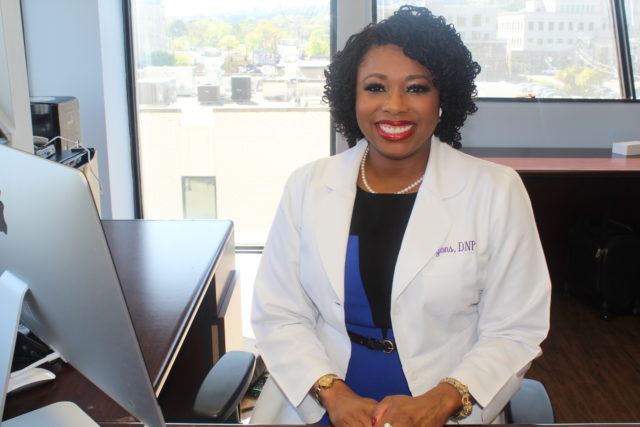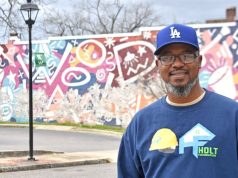By Ameera Steward
The Birmingham Times
Ebonee Lyons actually looked forward to doctor’s office visits as a child.
“I wanted to play with their tools,” she said. “I’m not quite sure what else I would be doing if I weren’t a nurse practitioner… It really changes people’s lives. … The thing I enjoy the most is providing extra time and extra education to patients.”
Lyons has been a nurse practitioner since 2010, and in December 2018 she opened Lyons Family Care in the Regions building in Homewood, Ala. The medical practice focuses on telemedicine, holistic care, disease prevention, and health promotion.
“I like people to understand why we’re doing what we’re doing, why [they’re given a certain] medication, what to expect if for some reason they don’t feel better, or what to do next if the medication doesn’t agree with them,” she said.
Lyons believes telemedicine, designed for patients who cannot physically come to the office, helps with her health services by enabling her to provide care via telecommunications.
Telemedicine is not new, she said: “It has been done since they put astronauts into space. … Medical scientists would communicate with astronauts in outer space via whatever method of technology they had.”
What’s new, she said, are people with unlimited access to cell phones.
“Before there were cell phones, … [medical providers] weren’t able to visually see [patients],” she said. “That technology may have been available for some entities, maybe large businesses, … but not everybody had access to it.”
More Flexibility
Telemedicine allows more flexibility because people are often on the go and don’t always have time to visit an office.
“There can be determinants for why people won’t necessarily seek health care,” she said. “Sometimes there may be variables like transportation, timing, whether an appointment is available.”
A Wi-Fi-enabled device is all that’s required to use telemedicine, Lyons said: “As long as it can get on the internet, telemedicine can be delivered through a video visit or through secure video portals, where you just basically log in and can look at the provider assessing you.”
Still, Lyons advises patients in need of urgent medical care to go to an emergency room. She added that telemedicine doesn’t necessarily replace regular visits to the doctor’s office.
“Help People Better”
Lyons, who is in her mid- to late-30s, has practiced for nearly a decade. She began her career in 2005 as a registered nurse in Birmingham and became a nurse practitioner after graduating from Samford University. Five years later, she earned a Doctor of Nursing Practice (DNP) degree from the University of Alabama, and she holds a board certification as a family nurse practitioner.
Lyons, who grew up in Conecuh County, said she has always had a curiosity about health care and health sciences in general, but “when I started nursing, I applied to the nurse internship program [at UAB], and that let me rotate through each unit.”
“I felt like it was really important to get some experience in each type of field, so I am able to help people better and be ready for any type of work setting or work environment,” she said, adding that her first job after graduate school was in pediatric primary care at Birmingham’s Metro Pediatrics from 2010 to 2015.
“That’s just one of the great things about being a nurse practitioner: you don’t have to limit yourself to a certain environment, and you can help with treating people across the life span.”
Send Messages Directly
Lyons said technology has changed the way people interact with medical providers.
“I always tell people, too, that they can contact me directly if they have questions. … We have a patient portal, so patients can send me messages directly. … I love that because it kind of cuts out people having to leave voice messages then wait for a call back,” she said. “Nobody wants to be at the pharmacy saying, ‘Oh my gosh, I’m out of refills’ and then have to wait days … to hear back from their provider. … People want access to their health care providers. They want to be in a relationship, to actually know their doctors and know that their doctors know them.”
Lyons likes that she has a small office where she can build a good rapport with patients.
“They get to know us, we get to know them,” she said. “The same people are here every day. [Patients] don’t see strangers or get rotated through. That kind of helps with consistency of care, continuity of care.”
The Lyons Family Care office, which also includes a medical assistant and staff, works by appointment and responds to messages very quickly.
“[Patients] get a response from us usually within a couple of hours, at the longest, if not right away,” Lyons said. “We have set office hours, … but I also have flexibility to schedule if there are special cases where people need something right away. I have the ability to reach out to and connect with [them].”
Prescriptions
Telemedicine can also help with prescriptions: “With flu-like symptoms, [for instance], a patient can show me their thermometer from home and say, ‘Hey, I’ve got a fever of this and these are my symptoms.’ So, instead of having to delay medications, … we go ahead and deliver them,” Lyons said. “Having that telemedicine delivery … can really change the dynamics for somebody, say, if they’re out of town … [and do not have access] to a location.”
Lyons knows the benefits of telemedicine on a personal level. While traveling out of state for nurse practitioner work in a rural area, she needed an urgent-care facility—and the closest one was a two-hour drive away.
“I was able to get online, do telemedicine, get seen, and have my needs addressed without having to worry about that transportation barrier or that location barrier being an issue. It helped with the convenience factor and helped with me not having to delay being seen,” she said. “[The experience] opened my eyes to all the things we can do and … all the ways we can help out by using technology.”
Lyons is also certified in California and Arizona and can assist patients in those states.
“The desire is to help people who sometimes don’t always have access to care,” she said. “The main thing I’m seeing now is an increase in the number of specialists but a decrease in the number of primary care or family practice providers. … The additional licenses broaden the number of people I’m able to help.”
“Stay Balanced”
As for what important advice she offers, Lyons said, it’s important that people “stay balanced.”
“We have our physical body that we have to nurture and take care of, but we also have our mental health, our spiritual side, so we have to keep everything in balance as much as possible.”
With mental health, it is important that people make time for self-care.
“People often times [have] a lot of stress or are highly stressed because of different things,” Lyons said. “Just being able to maintain a mental balance is key. … It’s really hard for your body to continue to stay healthy if there are things mentally that are not addressed.”
To learn more about or make a telemedicine appointment with Lyons Family Care, visit www.lyonsfamilycare.com or call 205-512-6419.




